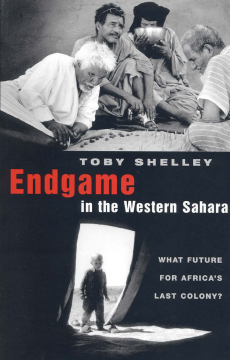
Additional Information
Book Details
Abstract
Why does this remote swathe of Sahara along the Atlantic seaboard concern the USA and Europe? Why does Morocco maintain its occupation? Why has the UN Security Council prevaricated for three decades while the Sahrawis live under Moroccan rule or as refugees?
In this revealing book, Toby Shelley examines the geopolitics involved. He brings out:
The little-known struggle of Sahrawis living under Moroccan rule to defend their identity.
USA/European competition for influence in the Maghreb.
The natural resources at stake -- rich fishing grounds, phosphates, and the prospect of oil.
The reasons behind the UN failure to resolve what is now Africa's last decolonisation issue.
The evolution of the USA-backed Baker Plan to settle the dispute.
How the Western Sahara's history and future is tangled up with Moroccan--Algerian rivalry.
The political development of Polisario, independence movement and state-in-waiting.
Toby Shelley has talked to Polisario, Moroccan, Algerian and other diplomats. He has visited the territory and had access to opposition activists and Moroccan officials. In the refugee camps he interviewed the leadership of Polisario. What emerges is that the fate of the Western Sahara is being moulded by global and regional forces and that it is the Sahrawis under Moroccan rule who are best placed to influence that fate.
Toby Shelley has reported from many countries in the Middle East, North Africa and Sub-Saharan Africa over the course of 20 years as a journalist. He works for The Financial Times. Previously he was regional energy news editor for Dow Jones Newswires. He contributes regularly to The Middle East International. His published work includes chapters in several books published by Zed and Khamsin and a short work on Palestinian trade unions in the West Bank. He first visited the Sahrawi refugee camps in 1988 and has followed the issue for many years.
'Toby Shelley provides a detailed account of the region's history since 1975.'
The Economist
'An excellent new book.'
Ian Black, The Guardian
'Shelley's book is the most comprehensive contribution to the debate over Western Sahara in English since Tony Hodge's seminal 'Roots of a Desert War', published 20 years ago.'
Deborah Hope, The Weekend Australian
'Toby Shelley focuses on the situation in the territory since the ceasefire of 1991... Where [he] takes up the story in earnest, he tells it very well, and his is the only full-length, readily available account in English that covers the years of failed diplomacy... He has visited Western Sahara and wrung a lot of interesting detail from towns where media access is strictly controlled and trouble-makers - pro-independence activists or the families of detainees - are kept away from visitors. His sense is that much now hangs on what Sahrawis in Western Sahara can do to challenge the occupation.'
Jeremy Harding, The London Review of Books
'The first real study of this obscure conflict in over 20 years.'
Middle East Policy
Table of Contents
| Section Title | Page | Action | Price |
|---|---|---|---|
| Cover | cover | ||
| Contents | v | ||
| Acknowledgements | vii | ||
| Chronology | viii | ||
| Foreword - José Ramos Horta | x | ||
| Map of the Western Sahara | xii | ||
| Introduction | 1 | ||
| 1. International Context: The Maghreb from ‘Cold War’ to ‘War against Terror’ | 6 | ||
| US ambitions for the Maghreb | 10 | ||
| Jealous France and post-colonial Spain | 16 | ||
| Notes | 23 | ||
| 2. Cain and Abel: The Western Sahara and the Struggle for Regional Supremacy | 26 | ||
| Changing interests in a changing world | 36 | ||
| The supporting players | 41 | ||
| Notes | 46 | ||
| 3. Morocco: Unstable and Counting the Cost of the Green March | 49 | ||
| Economic costs versus political benefits | 53 | ||
| Notes | 58 | ||
| 4. The Alchemist’s Dream: The Quest for Gold from the Desert Sand | 61 | ||
| Oil | 63 | ||
| Phosphates | 69 | ||
| Fisheries | 73 | ||
| Iron and other ores | 77 | ||
| Notes | 78 | ||
| 5. Sahrawi Society under Occupation | 81 | ||
| The demographic fog | 86 | ||
| Economic development: grand plans, grim reality | 89 | ||
| Notes | 95 | ||
| 6. The ‘Years of Lead’ | 97 | ||
| Notes | 106 | ||
| 7. An Identity Forged by Resistance | 108 | ||
| Notes | 114 | ||
| Photographs | A | ||
| 8. 1999: Civil Society and Breaking Down the ‘Wall of Fear' | 115 | ||
| Notes | 126 | ||
| 9. Zero-Sum Game: The Western Sahara and the UN Process | 128 | ||
| The Settlement Plan: from ceasefire to deadlock | 134 | ||
| Sidelining the Sahrawis | 147 | ||
| Baker tries again | 154 | ||
| Notes | 163 | ||
| 10. Polisario and the SADR: Guerrillas, Refugees and Their State-in-Waiting | 167 | ||
| Political evolution within the movement | 172 | ||
| The structure of Polisario’s state | 181 | ||
| Notes | 185 | ||
| 11. War: The Unbroken Chain | 187 | ||
| Notes | 196 | ||
| 12. Endgame | 198 | ||
| Notes | 207 | ||
| Index | 208 |
